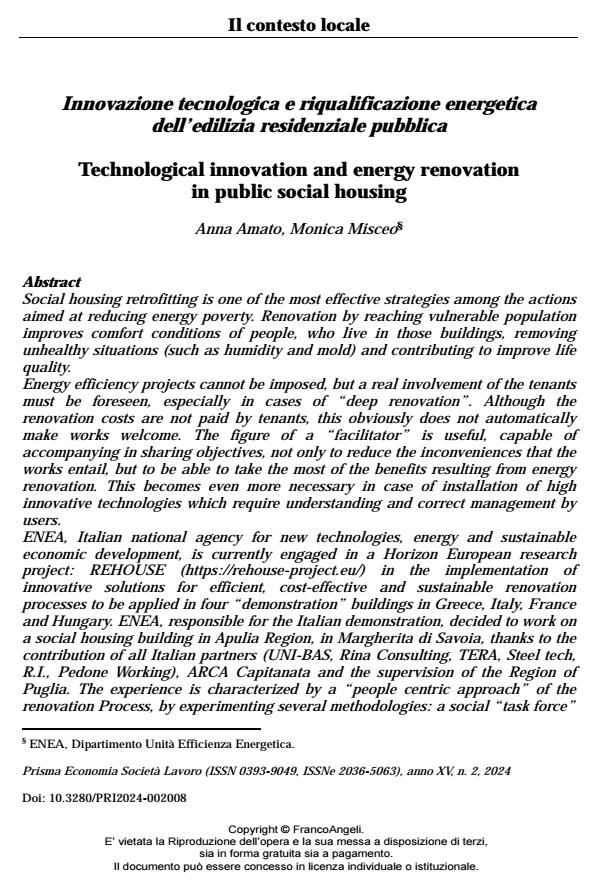Technological innovation and energy renovation in public social housing
Journal title PRISMA Economia - Società - Lavoro
Author/s Anna Amato, Monica Misceo
Publishing Year 2025 Issue 2024/2
Language Italian Pages 9 P. 102-110 File size 189 KB
DOI 10.3280/PRI2024-002008
DOI is like a bar code for intellectual property: to have more infomation
click here
Below, you can see the article first page
If you want to buy this article in PDF format, you can do it, following the instructions to buy download credits

FrancoAngeli is member of Publishers International Linking Association, Inc (PILA), a not-for-profit association which run the CrossRef service enabling links to and from online scholarly content.
Social housing retrofitting is one of the most effective strategies among the actions aimed at reducing energy poverty. Renovation by reaching vulnerable population improves comfort conditions of people, who live in those buildings, removing unhealthy situations (such as humidity and mold) and contributing to improve life quality. Energy efficiency projects cannot be imposed, but a real involvement of the tenants must be foreseen, especially in cases of “deep renovation”. Although the renovation costs are not paid by tenants, this obviously does not automatically make works welcome. The figure of a “facilitator” is useful, capable of accompanying in sharing objectives, not only to reduce the inconveniences that the works entail, but to be able to take the most of the benefits resulting from energy renovation. This becomes even more necessary in case of installation of high innovative technologies which require understanding and correct management by users. ENEA, Italian national agency for new technologies, energy and sustainable economic development, is currently engaged in a Horizon European research project: REHOUSE (https://rehouse-project.eu/) in the implementation of innovative solutions for efficient, cost-effective and sustainable renovation processes to be applied in four “demonstration” buildings in Greece, Italy, France and Hungary. ENEA, responsible for the Italian demonstration, decided to work on a social housing building in Apulia Region, in Margherita di Savoia, thanks to the contribution of all Italian partners (UNI-BAS, Rina Consulting, TERA, Steel tech, R.I., Pedone Working), ARCA Capitanata and the supervision of the Region of Puglia. The experience is characterized by a “people centric approach” of the renovation Process, by experimenting several methodologies: a social “task force” creation, including all the stakeholders, a targeted analysis of the social and housing context, co-design with the involvement of end-users at all stages, from design to development, with careful analysis of needs and identification of requirements, and the development of a S-LCA (social life cycle assessment). The relationship the tenants, which started a participatory process is ongoing, strengthening the community of tenants. This has already led to an enrichment and expansion of the initial project, in a neighbourhood perspective, and some deviations from initial proposals that were not judged easy to manage.
Keywords: Energy efficiency, Social Innovation, social housing
Anna Amato, Monica Misceo, Innovazione tecnologica e riqualificazione energetica dell’edilizia residenziale pubblica in "PRISMA Economia - Società - Lavoro" 2/2024, pp 102-110, DOI: 10.3280/PRI2024-002008